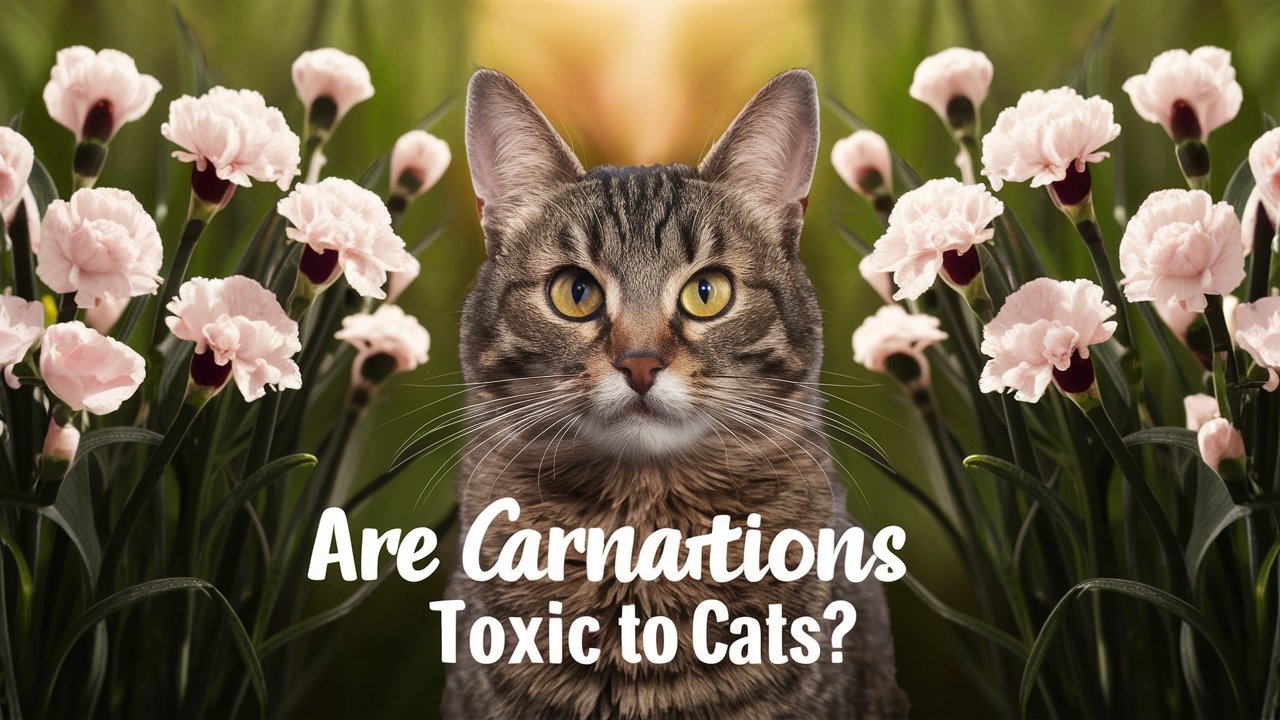
Are Carnations Toxic to Cats?
Yes, carnations are toxic to cats. This might come as a surprise, especially since carnations are a popular choice for bouquets and garden decorations. The toxicity of carnations comes from certain chemicals called triterpenoid saponins. When a cat ingests any part of a carnation, these chemicals can cause various health issues. Although the level of toxicity is generally mild to moderate, it’s still something that should be taken seriously.
Ingesting even a small amount of carnation can lead to discomfort in your cat. Common symptoms include vomiting, diarrhea, and drooling. Sometimes, your cat may also experience skin irritation if it comes into contact with the plant’s sap. While these symptoms might not be life-threatening, they can cause significant distress for your pet. This is why it’s important to be aware of the risks and take steps to prevent your cat from coming into contact with carnations.
What Are Carnations?
Carnations, scientifically known as Dianthus caryophyllus, are flowering plants widely admired for their ruffled petals and vibrant colors. They are often used in floral arrangements, garden beds, and as decorative accents in homes. Carnations come in various shades, including pink, red, white, and yellow, making them a favorite choice for many people. However, despite their beauty, carnations can be hazardous to cats if ingested.
How Do Cats Get Exposed to Carnations?
Cats can be exposed to carnations in several ways. If you have a bouquet of carnations in your home or if you grow them in your garden, your cat might be tempted to chew on the leaves or petals. Cats are naturally curious animals, and they often explore their surroundings with their mouths. Whether your cat is an indoor-only pet or has access to the outdoors, there’s a chance they might encounter carnations and decide to take a bite.

Signs of Carnation Poisoning in Cats
If your cat has ingested any part of a carnation, it’s important to watch for signs of poisoning. The symptoms can vary depending on the amount ingested, but common signs include:
- Vomiting: This is one of the most common signs that your cat has ingested something toxic.
- Diarrhea: Ingesting carnations can lead to digestive upset, resulting in loose stools.
- Drooling: Excessive drooling can occur if your cat’s mouth or throat is irritated by the plant.
- Loss of Appetite: Your cat may refuse to eat after ingesting carnations, especially if they’re feeling unwell.
- Lethargy: A poisoned cat might become unusually tired or sluggish.
- Skin Irritation: If your cat comes into contact with the sap of the carnation, it might develop redness or irritation on its skin.
What Should You Do If Your Cat Eats a Carnation?
If you suspect that your cat has ingested part of a carnation, the first thing you should do is remove any remaining plant material from their reach. Next, keep a close eye on your cat for any of the symptoms mentioned above. If your cat begins to show signs of poisoning, it’s crucial to contact your veterinarian immediately. They may ask you to bring your cat in for an examination or provide advice on how to manage the symptoms at home.
In most cases, carnation poisoning is mild, and symptoms may resolve on their own within a few hours. However, in more severe cases, your vet might recommend treatments such as administering fluids to prevent dehydration or providing medication to ease nausea and vomiting.
How to Prevent Carnation Poisoning in Cats
Prevention is the best way to protect your cat from carnation poisoning.
- Avoid Bringing Carnations into Your Home: If you have cats, it’s best to avoid keeping carnations in your home. Choose cat-safe flowers and plants instead.
- Keep Plants Out of Reach: If you do have carnations, make sure they’re placed in areas that your cat cannot access.
- Supervise Your Cat Outdoors: If your cat has access to the outdoors, keep an eye on them when they’re in the garden. Make sure they’re not nibbling on any plants, including carnations.
- Use Cat-Repellent Sprays: You can use cat-repellent sprays on your plants to deter your cat from chewing on them. Just make sure the repellent is safe for use around pets.

Are All Parts of the Carnation Plant Toxic?
Yes, all parts of the carnation plant are toxic to cats, but the level of toxicity may vary. The leaves stems, and flowers all contain the harmful triterpenoid saponins that can cause health issues in cats. The sap of the carnation, which can be found in the stems and leaves, is particularly potent and can cause skin irritation if your cat comes into contact with it.
What Other Plants Are Toxic to Cats?
Carnations are not the only plants that pose a risk to cats. Several other common household and garden plants can be toxic to your feline friend, including:
- Lilies: Extremely toxic to cats and can cause kidney failure even in small amounts.
- Poinsettias: Often used as holiday decorations, poinsettias can cause mild to moderate symptoms if ingested.
- Tulips: The bulbs of tulips contain toxins that can cause vomiting, diarrhea, and drooling.
- Aloe Vera: While beneficial for humans, aloe vera can cause digestive upset in cats.
- Sago Palm: All parts of this plant are toxic, and ingestion can lead to severe liver damage.
To ensure your cat’s safety, it’s important to be aware of the plants in your home and garden. If you’re unsure whether a plant is safe for your cat, it’s always best to err on the side of caution and remove it from your environment.
Creating a Cat-Safe Environment
One of the best ways to protect your cat from toxic plants like carnations is to create a cat-safe environment. This means carefully selecting the plants you bring into your home and making sure they’re safe for your cat to be around. Here are some tips for creating a cat-safe space:
- Choose Cat-Friendly Plants: Opt for plants that are known to be safe for cats, such as catnip, basil, and rosemary.
- Use Artificial Plants: If you love the look of flowers but don’t want to risk your cat’s health, consider using artificial plants instead.
- Provide Alternatives: Give your cat plenty of toys and scratching posts to keep them entertained, so they’re less likely to chew on plants.
- Educate Yourself: Familiarize yourself with common toxic plants and make a habit of checking the toxicity of any new plants you bring home.

Conclusion: Are Carnations Toxic to Cats?
In conclusion, while carnations are beautiful and popular flowers, they are toxic to cats and should be kept out of reach of your feline friends. By understanding the risks and taking steps to prevent exposure, you can ensure that your home is a safe and happy environment for your cat. Always be mindful of the plants you bring into your home and garden, and opt for cat-friendly alternatives whenever possible.
FAQS: Are Carnations Toxic to Cats?
What happens if a cat eats a carnation?
If a cat eats a carnation, it may experience symptoms of mild to moderate poisoning. Common symptoms include vomiting, diarrhea, drooling, and loss of appetite. In some cases, the cat might also show signs of skin irritation if it comes into contact with the plant’s sap. While these symptoms are usually not life-threatening, they can cause significant discomfort for your cat, and it’s important to monitor them closely and consult a veterinarian if symptoms persist.
What is the least toxic flower to cats?
The least toxic flowers to cats include roses, sunflowers, and orchids. These flowers are generally safe for cats, meaning they pose minimal risk if ingested. However, it’s still a good idea to keep all plants out of your cat’s reach to avoid any potential digestive upset.
What is the most toxic flower to cats?
The most toxic flowers to cats are lilies, particularly Easter lilies, daylilies, and tiger lilies. Even a small amount of any part of a lily plant can cause severe kidney failure in cats, which can be life-threatening if not treated immediately.
Are roses and carnations safe for cats?
Roses are generally safe for cats, but their thorns can cause physical injury if a cat tries to chew on or play with the flowers. On the other hand, carnations are toxic to cats. While the level of toxicity is typically mild to moderate, ingesting carnations can lead to symptoms like vomiting, diarrhea, and drooling. It’s best to keep carnations out of reach of your cat.
Can cats lick roses?
Cats can lick roses without significant risk, as roses are not toxic to cats. However, you should be cautious because the thorns on roses can cause injury to your cat’s mouth, paws, or skin. Additionally, if the roses have been treated with pesticides or other chemicals, licking them could be harmful. To be safe, keep roses in a location where your cat cannot easily access them.
Is Callisia Repens Toxic To Cats?

I am a dedicated writer and expert in cats, with years of experience studying feline behavior, health, and breeds. Passionate about sharing my knowledge, I provide valuable insights and practical advice to help cat lovers understand and care for their furry companions. When not writing, I enjoy spending time with my beloved cats, continually learning and deepening my expertise.

Leave a Reply